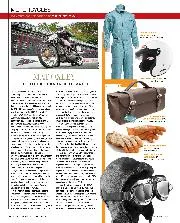
Mat Oxley
The other German bike maker The appearance of a replica of a TT-winning DKW at the recent Classic TT came about thanks to the Audi Tradition team, which promotes the…
Sir,
The interesting Editorial in your May issue suggests the hope that MOTOR SPORT might not be adverse to the subject of professionalism being ventilated in its columns. If this is so, it might be said quite frankly that a man accustomed to other sports is perplexed and even horrified by the laxity he finds in the sporting side of motoring. Putting aside the question whether it is fair to expect the genuine amateur, with his limited opportunities, to compete against professionals or semi-professionals subsidised and supported by commercial interests, the real gravity of the present position seems to be its effect upon the public mind. The technical press, together with all supporters of the game, is grieved at the comparative lack of interest shown in racing, but nobody seems bold enough to suggest that this may very well arise from a feeling that the sport is a suspect one. The new-corner soon learns that drivers. who, tacitly no doubt, masquerade as amateurs are really either employed by the trade or at any rate are not above receiving what are known as ” boni ” from parties interested in a win. So there arises a conviction that the sport is not
a ” clean ” one, and interest lapses except perhaps among some younger members of the community who have never had an opportunity of understanding the accepted code of sportsmanship. It may be that out disappointed friend turns his attention to trials, but there again he is doomed to disillusion, for he finds out that a car bearing a definite outward appearance may not resemble the standard product in the slightest, and that its .driver may well be among those Officially or semi-officially attached to some factory or other. In consequence, he becomes cynical as to the justice of the much advertised awards, and he resents the notion that he is regarded as
a simpleton to be deceived by astute commercial people. The remedy for this unpleasant con
dition of things is a drastic one, but I feel that it should be stated fearlessly. The governing body will have to purge itself of any direct or indirect connection with those concerned with the manufacture or sale of cars, so as to make it clear to the publie that commercial interests have no influence on its decisions. It must then adopt the customary definition of amateurism, and it must penalise ruthlessly those who compete with professionals by excluding them from .amateur status. This might seem a matter of indiffer
ence to those who, erroneously, imagine that indulgence in a sport is a proper method of adding to their incomes, but when they are reminded that the penalty entails exclusion from clubs,, and a degradation to the social position of chauffeurs or other paid servants, they might re-consider their views. These proposals might seem draconic
to those accustomed to the present loose control of the sport, but they might be asked to recollect that they are no more than a statement of the code unanimentsly adopted in almost every other variety of sporting activity. I am, Yours etc.,
J. D. AVLwARD. West Kirby,
Cheshire.
While we do not necessarily endorse these views, we think they ‘merit what publicity we can afford them. Although the ri er has to our knowledge owned such sporting marques as M.G., 13ugatti and Aston-Martin, he has never carried competition numbers and consequently has no axe to .grind as a disgruntled competitor. As an amateur he has been a participant in ychting and rowing contests..